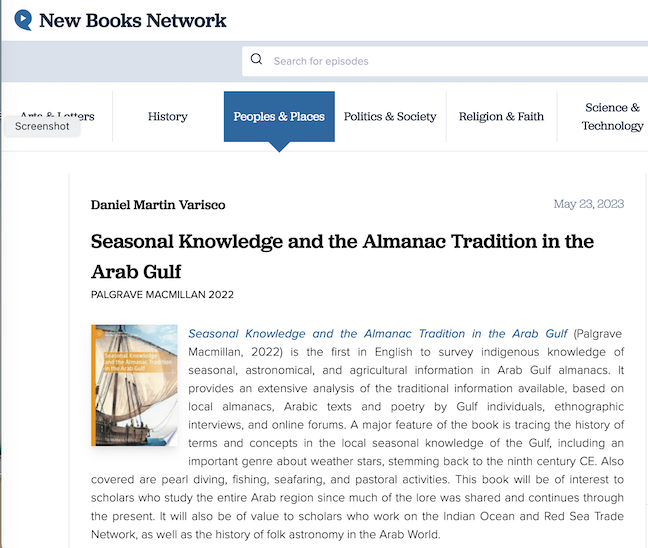
My podcast with Ahmed AlMaazmi and Tamara Fernando is posted online on the New Books Network.

My podcast with Ahmed AlMaazmi and Tamara Fernando is posted online on the New Books Network.
I will be giving a book launch on my recent book on Gulf almanac lore via Zoom for the Qatar National Library on February 22, 2023. Details about registering for the talk are provided at https://events.qnl.qa/event/opOp5/EN. Please feel free to spread word of the talk. Details on the book are at:https://link.springer.com/book/10.1007/978-3-030-95771-1.
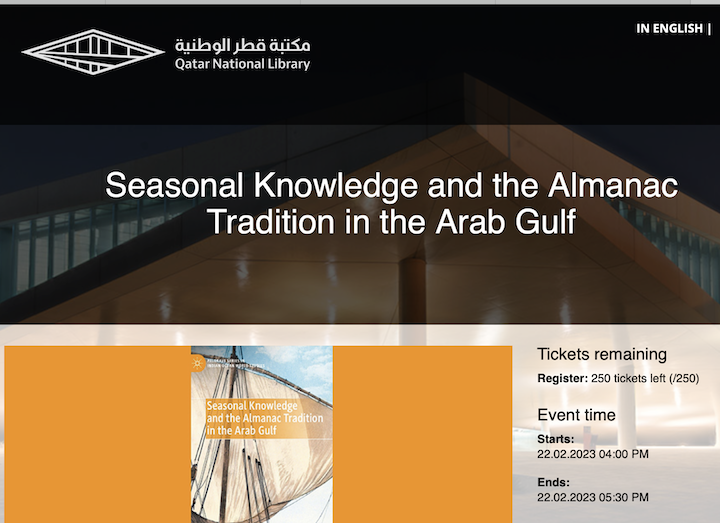
I am pleased to announce the publication of my new book: Seasonal Knowledge and the Almanac Tradition of the Arab Gulf. Details about the book, including a free online pdf of the table of contents can be obtained here: https://link.springer.com/book/10.1007/978-3-030-95771-1
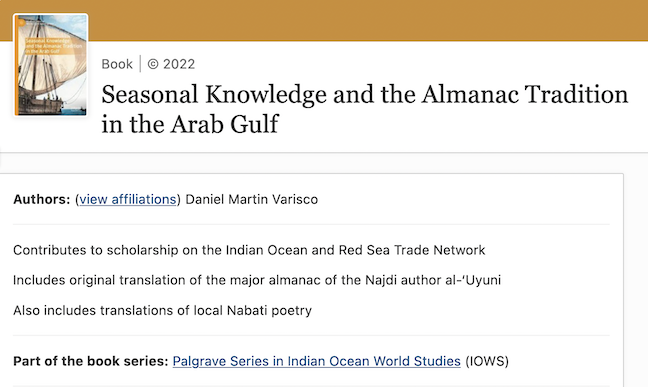
Below is the start of the Introduction…
Before the middle of the twentieth century, everyday life in the Arab Gulf was oriented to the sea and the land. Along the coast and for the island of Bahrain there had been a thriving pearl diving industry until the 1920s, while fishing remained one of the most important food production activities. Trade around and beyond the peninsula was still largely carried out by traditional dhows. Apart from Oman, which has a long tradition of irrigated and rainfed agriculture, most of the Gulf states faced a harsh, arid environment with limited water and only a few fertile oases. Herding of camels, sheep and goat was one of the main ways of surviving in the arid areas. It should not be surprising that prior to the oil wealth that created a lush economic transformation, the main topic of concern was the weather. Successful navigation, pearl diving and fishing required an intimate knowledge of seasonal change, as did pastoralism and farming.
Information on the seasonal sequence for the Arabian Peninsula stems back over a thousand years in collections of poetry, star lore and almanacs. One of the most important Arabic texts is the Kit?b al-Anw?’ (Book of Weather Stars) of Ibn Qutayba (d. 276/879), who is quoted by almanac compilers in the Gulf to this day. Ibn Qutayba describes in detail local knowledge about star risings and settings, weather seasons, pastoral activities, agriculture and a range of environmental conditions. Unfortunately, much of this indigenous heritage has disappeared, as the folklore of generations is now rarely passed on orally within families. In recent years older individuals in the Gulf have written memoirs, preserving their knowledge of life before the Petro Utopia. This gives us a glimpse of the past, a puzzle with many missing pieces, but not the full understanding that comes with actual contact.Resurrecting the history of seasonal knowledge in the Arab Gulf and the entire Arabian Peninsula thus requires a textual archaeology. It is not enough to simply document what is written, as though one is showing off museum objects; this knowledge needs to be placed into a lived context to have a better understanding of how people went about their lives off the land and on the sea.
The past is like an ocean in which we can sample only a small part of the vast number of ideas and customs that have passed by over the years. To follow this metaphor, most of our sampling is along the shore, learning from individuals we can ask directly or engage with in ethnographic fieldwork. We can only cast our research net a short distance in trying to reach back into what really happened and was said in the past. A historian can sail as well, dropping an anchor where there seems to be something worth exploring. But there are depths in this ocean of knowledge that can never be reached. There are also reefs, barriers that make it difficult to have smooth sailing through our disciplined search for the past. To what extent can we know what local knowledge was shared? Then there is the question of what kind of fish we are trying to catch. Is everything that has been done and said, no matter how many generations back, something we should call “heritage”? If we read about it in a book, even one written centuries ago, does that automatically make it “heritage”? How can we vouch for the accuracy of what has been written down when we cannot see it for ourselves or question the interpreter? These are not insurmountable hurdles, but they do caution us to recognize the limitations of reconstructing the past.
My career as a scholar began in the highland mountains of Yemen, where I carried out ethnographic research on traditional water resource use and local agriculture in the late 1970s. Talking with farmers and observing their work for over a year allowed me to gain an understanding of local practices that no book could give me. While in the field I had access to a fourteenth century Yemeni agricultural text, which described many of the agricultural activities I was seeing for myself. My first book was an edition and translation of a thirteenth century Yemeni agricultural almanac. Over the years I have become what is best called a historical anthropologist, someone who looks at heritage as a product evolving from a past and not simply what one sees, without hindsight, functioning in the present. As an anthropologist I focus on the diversity of what people do and say, giving voice to them rather than plugging them into an outside theoretical package from the start. As a historian I have an opportunity in examining texts to see the strands of past knowledge that survive and still influence the present.
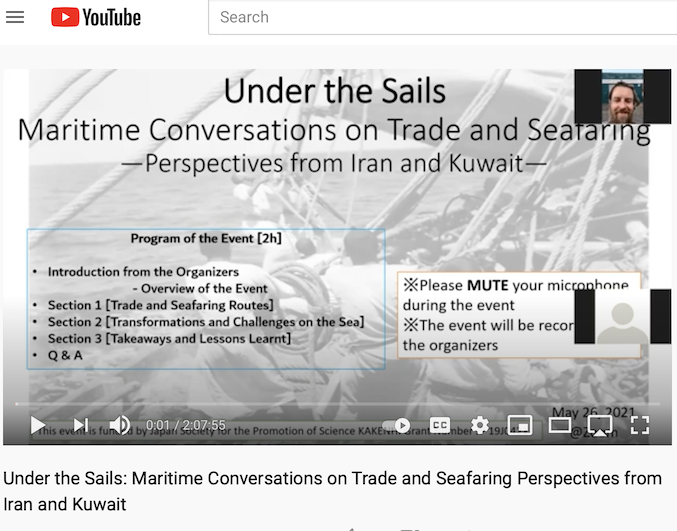
The online event “Under the Sails – Maritime Conversation on Trade and Seafaring. Perspectives from Iran and Kuwait” held on May 26, 2021 is now available to view on Youtube. This is a fascinating set of interviews with both Kuwaiti and Iranian ship captains of the past. It is well worth watching.
This is to note that I have received a research grant from the Qatar Foundation for a study of indigenous knowledge of the seasons and time-telling in the Gulf. I have created a separate webpage to indicate progress through updates on the progress. This page is at https://tabsir.net/?page_id=2903

For my post on the Arab youth views of democracy, click here.
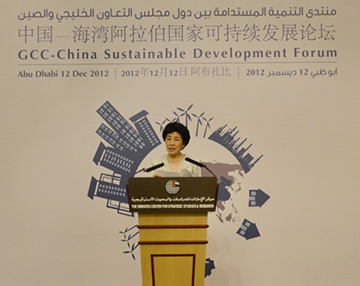
The GCC States and the Viability of a Strategic Military Partnership with China
By Imad Mansour, Qatar University, The Middle East Institute, Mar 17, 2015
The term “strategic partnership†has been increasingly used in GCC circles to signify that relations with China are important and worthy of long-term investment. In a March 14, 2014 speech during his visit to Beijing, Saudi Arabia’s then Crown Prince Salman announced that “we are witnessing the transformation of the relationship with China to one of strategic partnership with broad dimensions, to the benefit of both our countries.â€[1] Saudi Arabia’s position was echoed by the emir of Qatar during a 2014 visit to China in which issues of common concern to all GCC states, especially combating terrorism, were discussed.[2] Abdel-Aziz Aluwaisheg, GCC general assistant secretary for negotiations and strategic dialogue, has also noted that there is growing interest in the Gulf to develop a “strategic dialogue†with China.[3]
Despite this growing GCC recognition of China’s strategic role in the region, what exactly a “strategic partnership†or “strategic dialogue†would look like remains unclear. This essay discusses why officials in GCC member states might be hesitant to embrace the idea of China as a viable strategic military partner, while at the same time recognizing the need to further develop relations with China.
Securing Independent Military Capabilities
From the perspective of GCC leaders, the main military advantage of partnership with China is Beijing’s potential willingness to provide weapons that the United States is currently reluctant to sell. Given the United States’ lukewarm responses to recent regional unrest, the GCC countries are seeking to augment their independent capabilities, and China could be an important supplier, whether or not it is a full “strategic partner.â€[4] These GCC views are based on the understanding that as economic interdependence grows, China might be more willing to provide advanced weapons systems in greater quantities. It is important to note that looking to China for arms sales is consistent with the GCC states’ broader strategy of expanding their network of suppliers.[5]
However, GCC leaders continue to assess the benefits of such an arrangement through the prism of their enduring relationship with the United States. This is largely due to historical momentum. GCC states have long procured most of their military hardware, training, intelligence systems, and combat systems directly from the U.S. government or from American businesses. In addition, the United States and its allies share GCC concerns about containing regional conflicts in Iraq and Syria, as well as the region-wide threat posed by al-Qa‘ida and its affiliates.[6] Furthermore, it seems that despite its reluctance to sell certain weapons directly to the GCC, the United States has tacitly approved GCC purchases of such weapons from China.[7] This balance―whereby the United States sells the GCC most of its conventional weapons systems, while GCC states purchase other approved weapons elsewhere―allows the GCC to accrue the benefits of remaining within the U.S. umbrella while also buttressing its defenses. Obtaining military hardware from China that the United States has not approved would involve an extremely delicate diplomatic game—one in which the GCC stands to lose more than it would currently gain. Continue reading The GCC and China